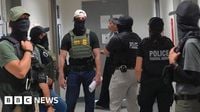California has once again positioned itself at the forefront of the nation’s immigration debate, drawing a sharp line against the Trump administration’s renewed enforcement tactics. On September 21, 2025, Governor Gavin Newsom signed a sweeping package of five new laws in Los Angeles, each aimed at curbing the power and presence of federal immigration agents within the state. The centerpiece of this legislative push is Senate Bill 627, dubbed the “No Secret Police Act,” which bans most local and federal law enforcement officers—including those with Immigration and Customs Enforcement (ICE)—from wearing face masks while on duty, effective January 1, 2026. The move, a first-in-the-nation measure, has sparked immediate and fierce debate across the political spectrum.
Governor Newsom, surrounded by immigrant advocates and local leaders, made his intentions clear. “Immigrants have rights and we have the right to stand up and push back,” he declared, according to The Los Angeles Times. The new law is part of a broader effort to shield vulnerable communities from what Newsom described as “secret police” tactics—where masked, unidentified officers detain individuals in public spaces, often without providing identification or cause. The ban does allow for some exceptions: undercover agents, masks used for disease or wildfire protection, and certain tactical gear are exempted.
The legislation was drafted in direct response to a series of high-profile federal immigration raids in Los Angeles earlier in 2025. These operations, which saw agents donning masks and refusing to identify themselves, triggered weeks of protests and unrest across the city. President Donald Trump, in his second term, responded by deploying 700 US Marines and 4,000 National Guard troops to Los Angeles—a move that only intensified the standoff between California and the federal government.
Senator Scott Wiener, the San Francisco Democrat who authored the mask ban, was blunt in his assessment of the federal raids. “ICE’s recklessness creates chaos as agents run around with what are effectively ski masks and no identification, grabbing people, throwing them in unmarked vehicles, and disappearing them,” Wiener said during legislative hearings, as reported by Sacramento Bee. “When law enforcement officers hide their identities, it destroys community trust.”
But the mask ban is just one piece of the legislative puzzle. The new laws also set strict limits on where and how federal agents can operate within California’s borders. Under Assembly Bill 49, school officials and employees are prohibited from allowing immigration officers onto campus without a judicial warrant, court order, or subpoena. Senate Bill 81 extends similar protections to hospitals and emergency rooms, making non-public areas off-limits to officers without the proper legal documentation. Another measure requires law enforcement officials to identify themselves by both name and badge number while carrying out their duties, further boosting transparency and accountability.
Families must now be notified if officers arrive at their children’s schools, and student information and classrooms are protected from unauthorized access. Supporters argue these measures are essential to ensure that California’s schools and hospitals remain safe havens, free from the specter of sudden immigration enforcement actions. Shiu-Ming Cheer, deputy director at the California Immigrant Policy Center, told CalMatters that the bills “could offer real protections for people simply trying to go to school or see a doctor without fear of being detained,” provided there is vigorous monitoring and enforcement.
Not everyone, however, is convinced the new laws will have much practical effect. Federal officials were quick to denounce the mask ban and related measures, arguing that California lacks the authority to regulate federal agents. US Attorney Bill Essayli, a Trump appointee, dismissed the legislation, stating, “California has no jurisdiction over the federal government,” and insisted that federal agents “will continue to protect their identities.” Department of Homeland Security Assistant Secretary Tricia McLaughlin went even further, blasting the laws as “despicable” and a “flagrant attempt to endanger our officers.” In a statement, she warned, “Make no mistake, this type of rhetoric is contributing to the surge in assaults of officers through their repeated vilification and demonization.”
California’s own law enforcement community is also divided. Many police unions and local law enforcement groups opposed the mask ban, contending it will fall more heavily on local officers than on federal agents—who, they argue, are likely to challenge the law in court. Brian Marvel, president of the Peace Officers Research Association of California, told San Francisco Chronicle, “It’s using an emotionally charged issue on a federal level to pass a bill that will only affect local peace officers. You’re upset with the feds, but you’re going to punish us.” Ed Obayashi, a longtime California police officer and policy adviser, echoed those concerns, saying, “You cannot regulate lawful federal conduct, whether the Legislature likes it or not.”
Legal experts agree the state may struggle to enforce the new laws, especially against federal agencies. Kevin Johnson, an immigration law professor and former dean of the UC Davis School of Law, noted that similar restrictions passed in 2018—such as barring immigration arrests at superior court buildings—did little to deter federal agents. “The federal government is going to continue doing what it’s doing, in one form or another,” he said to CalMatters. Still, Johnson conceded the legislation “gives some hope and optimism to communities that feel under fire, vulnerable and basically hated by the federal government.”
For supporters, the symbolic value of the laws is at least as important as their practical impact. Political consultant Mike Madrid, a Republican who co-founded the anti-Trump Lincoln Project, told Los Angeles Times, “California has done what no other state has done: establish itself as the tip of the spear on resisting a lot of these efforts that are an affront to its values. Ninety-nine percent of this is the purview of the federal government. So a lot of it is just symbolic, but symbolism matters. It’s both politically astute but also morally right.”
The legislative push comes on the heels of a controversial Supreme Court ruling that allowed immigration enforcement stops in Los Angeles to continue without officers needing reasonable suspicion. This decision, which permits questioning and detaining people based solely on race, language, or job, has galvanized California’s Democratic lawmakers to act. “We need a full front defense for the violence that is coming from this regime,” said Hector Pereyra, policy manager for the Inland Coalition for Immigrant Justice, which co-sponsored the mask ban and other protective measures.
Los Angeles Mayor Karen Bass summed up the mood at the signing ceremony: “All of this legislative resistance is to protect Angelenos from their own federal government. That is profound.” Whether these new laws withstand judicial scrutiny or not, California has drawn a bold line—insisting on dignity, transparency, and the right for its residents to live without fear of masked, unidentified officers in their communities.


